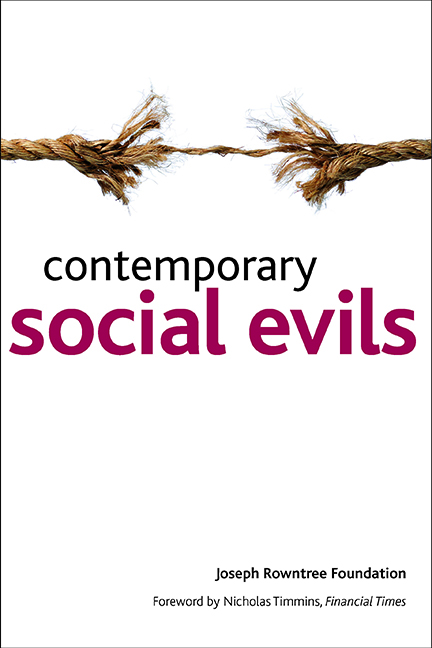Book contents
- Frontmatter
- Contents
- Foreword
- Acknowledgements
- Notes on contributors
- 1 Introduction
- 2 ‘Social evils’ and ‘social problems’ in Britain since 1904
- Section 1 Public Voices
- Section 2 Viewpoints
- A decline of values
- Distrust
- The absence of society
- Individualism
- Inequality
- Section 3 Reflections
- Appendix: How the ‘social evils’ consultations were organised
- Index
Appendix: How the ‘social evils’ consultations were organised
Published online by Cambridge University Press: 26 January 2022
- Frontmatter
- Contents
- Foreword
- Acknowledgements
- Notes on contributors
- 1 Introduction
- 2 ‘Social evils’ and ‘social problems’ in Britain since 1904
- Section 1 Public Voices
- Section 2 Viewpoints
- A decline of values
- Distrust
- The absence of society
- Individualism
- Inequality
- Section 3 Reflections
- Appendix: How the ‘social evils’ consultations were organised
- Index
Summary
Plans for the Joseph Rowntree Foundation's (JRF) programme were developed in late 2006. From the outset, the emphasis was on eliciting a wide range of views and stimulating public debate.
The online consultation
It was decided to set up a website consultation, through which it was hoped to access a large number of responses in a short period of time. This ran between July and September 2007. People were asked to write briefly about the three social evils that, in their view, caused ‘the most damage to British society as a whole or the most misery to its people’. The aim was to include society-level issues as well as issues that impacted at the individual level. However, the definition was deliberately open-ended, with every care taken to avoid leading respondents in particular directions (see Chapter 3).
A total of 3,500 submissions were received via the website and a further 100 responses were sent to the JRF by post. The responses were analysed using a substantial coding process designed to capture the depth and richness of the opinions expressed.
Listening to often ‘unheard’ voices
It was acknowledged from the outset that relying solely on a website would exclude many people. Only 61% of UK households in 2007 had access to the internet. It was also recognised that the publicity that was planned for the programme was more likely to reach some groups than others. Moreover, it was anticipated that a considerable number of people would be unlikely to participate in a website consultation even if they had access to the internet. This might reflect a lack of time and inclination, but it might also stem from personal circumstances that related directly or indirectly to the kind of excluding social problems on which the consultation was expected to focus.
It was, therefore, decided to include the views of a range of people whose voices are often neglected in such discussions. NatCen (National Centre for Social Research), an independent social research organisation, was commissioned to capture the views of ‘unheard’ groups such as carers, unemployed people, young homeless people, ex-offenders and care leavers. Participants were contacted with the help of charities, agencies and community-based programmes.
- Type
- Chapter
- Information
- Contemporary Social Evils , pp. 233 - 234Publisher: Bristol University PressPrint publication year: 2009



